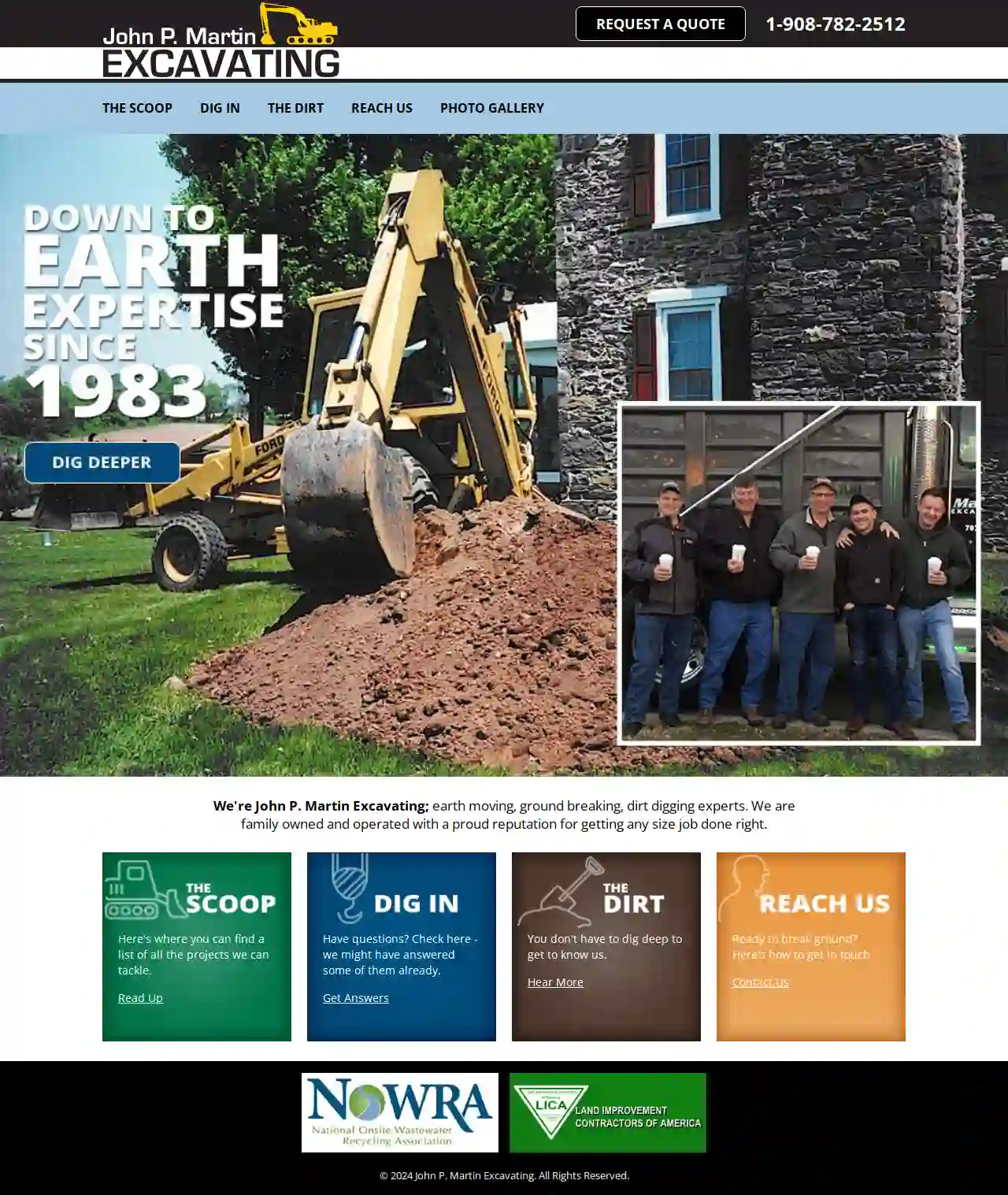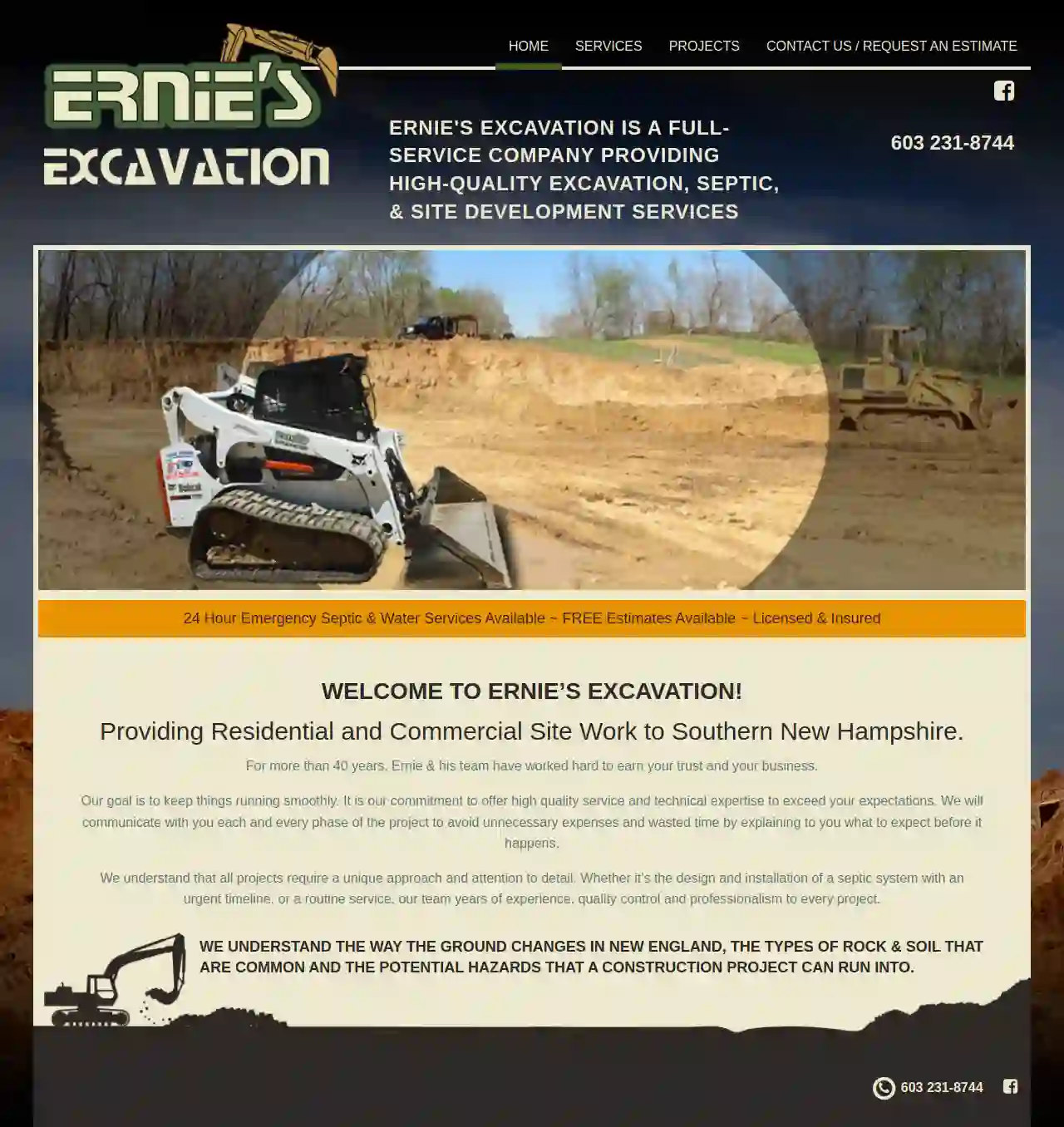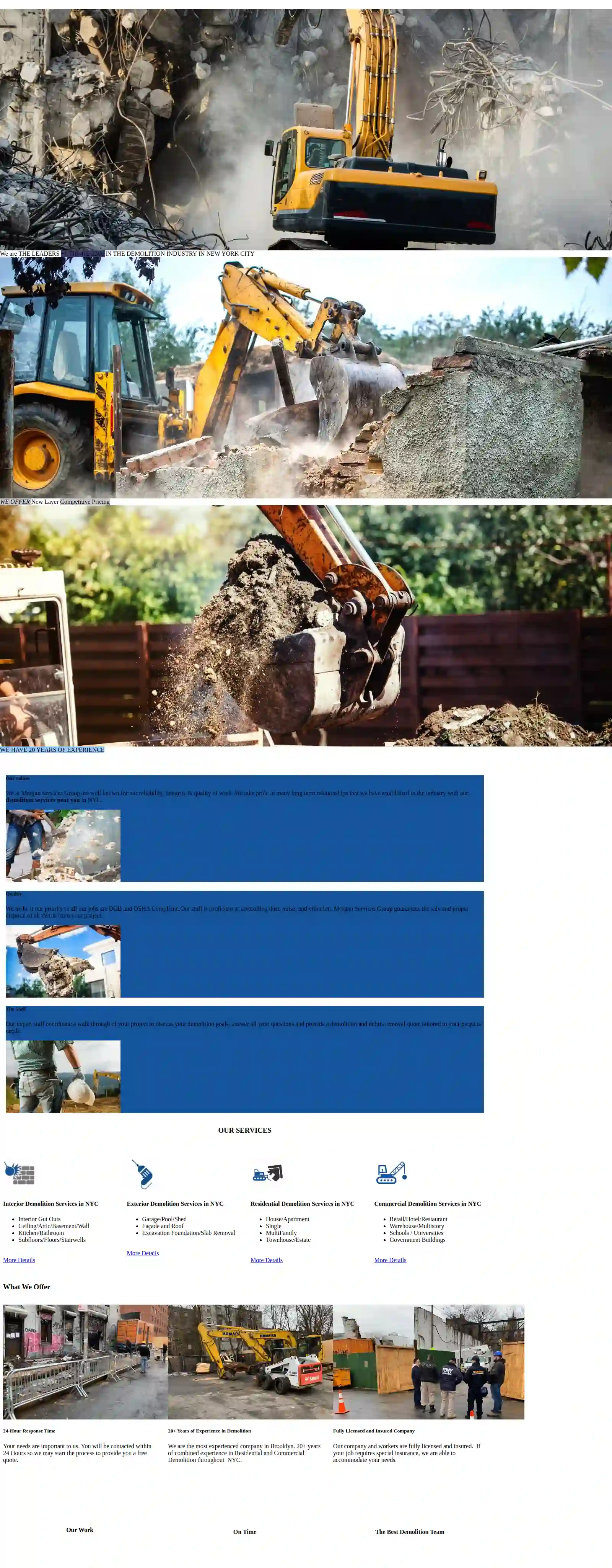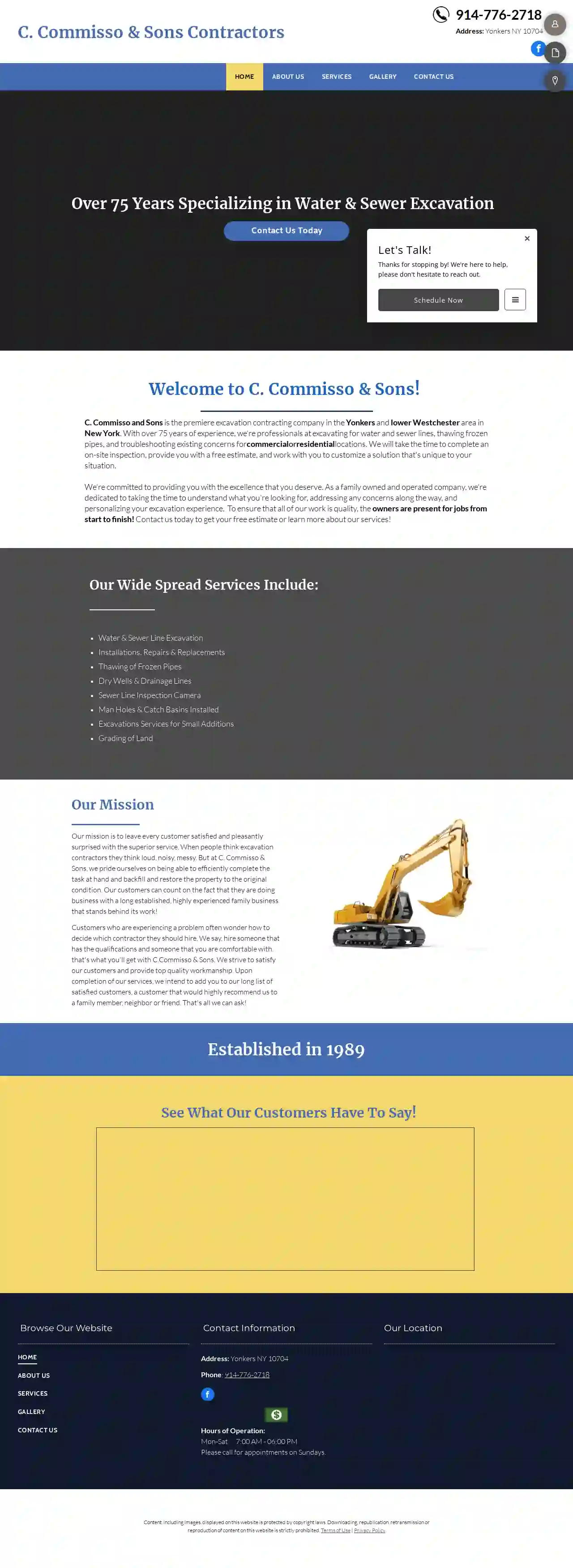Demolition Contractors Moriah
Find Demolition Contractors Near Me in Moriah
Get multiple Demolition Companies quotes for your project today! Compare profiles, reviews, accreditations, portfolio, etc... and choose the best service.

Apex Excavating & Construction Services, LLC
517 reviewsClay, USWelcome to Apex Excavating & Construction Services, LLC We are a team of experienced professionals committed to delivering top-quality services to our clients. Our company specializes in excavation, site preparation, and construction services in Greensboro & The Piedmont. We hold an unlimited general contractors license, so we can work on any project, no matter the size and scope. If you want to build ANYTHING, we can help. We may have started in site development, but our customers kept asking if we could build their driveway or help stand up a shed in their yard. So we added construction services to our offerings. We started small and as we grow, we strive to maintain our small company feel. By strategically partnering with skilled tradesmen in North Carolina, we maintain the flexibility of a small business, while being able to scale to meet the demands of big projects. Our mission is simple: To provide our customers with exceptional service, quality workmanship, and a smooth construction experience from start to finish. Whether you’re a homeowner, business owner, or contractor, we are committed to delivering outstanding value and exceeding your expectations in everything we do. We’re Apex Excavating & Construction Services, a family owned and locally operated construction and site development company in Greensboro, NC. We’ve been tearing up the ground and building things in the Piedmont for years, and we’re proud to be a part of the community. We’re committed to providing our customers with the highest quality services at a fair price. We’re also committed to safety, and we take every precaution to ensure that our employees and customers are safe on the job site.
- Services
- Why Us?
- Gallery
Get Quote
Buraq Construction Inc
571 reviews1307 Foster Ave, Brooklyn, 11230, USAbout Us Buraq Construction Company was established to offer general construction business in New York City, and has been giving excellent service for more than 10 years. We are the specialists in luxury construction services of the highest standard and safety while keeping up the same standards and quality. Our experienced team is well-versed in navigating the complexities of city regulations and addressing violations efficiently and effectively.
- Services
- Why Us?
- Gallery
Get Quote
The State Group Industrial USA Ltd
54 reviews810 Crescent Centre Drive, Suite 280, 810 Crescent Centre Drive Suite 280, Franklin, 37067, USThe State Group: Mission Critical Multi-Trade Services For over 60 years, The State Group has been a leading multi-trade service contractor on projects, maintenance, and service throughout the United States and Canada. We are committed to providing our clients with the highest quality services, delivered safely and efficiently. Our team of highly skilled professionals has a wealth of experience in a diverse range of industries, including power, renewable energy, electric vehicle/automotive, mission critical, manufacturing, metals & mining, energy, chemical processing, food and beverage processing, and commercial and institutional. Our Values Our values are the foundation of everything we do. We are committed to: Safety: Our commitment is Everyone Goes Home Safe. Quality: We strive for excellence in everything we do. Integrity: We are honest and ethical in all our dealings. Teamwork: We work together to achieve our goals. Innovation: We are constantly seeking new and better ways to serve our clients. Our People Our people are our greatest asset. We are committed to providing our employees with a safe and rewarding work environment. We offer competitive salaries and benefits, as well as opportunities for professional development. If you are looking for a challenging and rewarding career, we encourage you to apply.
- Services
- Why Us?
- Gallery
Get Quote
White's Excavation and Land Services
520 reviewsLaurel, Delaware, USWelcome to Whites Excavation and Land Services! With years of experience and our commitment to quality work, we are the premier excavation and land services provider in Delmarva. Our team of professionals provides a range of services to meet the needs of our clients, from land clearing to site preparation and demolition. We have worked with a variety of commercial, industrial, and residential customers, providing them with quality services on time and within budget. Our commitment to customer satisfaction and safety is unmatched, and our years of experience make us the go-to provider of excavation and land services in the area. Whether you’re preparing for a residential build or clearing a path for commercial property, you can rely on Whites Excavation & Land Services. You’ll be impressed by our level of commitment and attention to detail!
- Services
- Why Us?
- Gallery
Get Quote
John Martin Excavating
510 reviews123 Main Street, City, 12345, USAbout JPMartinez Excavating JPMartinez Excavating is a family-owned and operated business serving the greater [CITY] area. We have over 20 years of experience in the excavating industry, providing high-quality services to both residential and commercial clients. Our commitment to customer satisfaction and attention to detail has earned us a reputation for excellence in the community. We understand that excavating projects can be complex and require a high level of expertise. That's why we have a team of skilled and experienced professionals who are dedicated to providing you with the best possible service. We use only the latest equipment and techniques to ensure that your project is completed on time and within budget. Whether you need site preparation, foundation work, utility installation, or any other excavating service, JPMartinez Excavating is the company to call. We are committed to providing our clients with the highest level of service and satisfaction. Contact us today for a free estimate.
- Services
- Why Us?
- Testimonials
Get Quote
Ernie’s Excavation
4.713 reviewsNew York, USWELCOME TO ERNIE’S EXCAVATION! Providing Residential and Commercial Site Work to Southern New Hampshire. For more than 40 years, Ernie & his team have worked hard to earn your trust and your business. Our goal is to keep things running smoothly. It is our commitment to offer high quality service and technical expertise to exceed your expectations. We will communicate with you each and every phase of the project to avoid unnecessary expenses and wasted time by explaining to you what to expect before it happens. We understand that all projects require a unique approach and attention to detail. Whether it’s the design and installation of a septic system with an urgent timeline, or a routine service, our team years of experience, quality control and professionalism to every project. We understand the way the ground changes in New England, the types of rock & soil that are common and the potential hazards that a construction project can run into.
- Services
- Why Us?
- Gallery
Get Quote
Bulldog Contracting & Excavating Inc.
528 reviewsNesconset, USNew York's Leading Excavation Company Family Owned & Operated since 1987 Decades of Operational Excellence Since 1987 With a foundation established in 1987, Bulldog Contracting, Inc. boasts a rich history of proficiency in excavation and construction. Our extensive experience ensures clients benefit from a depth of knowledge and skill honed over many successful projects. Integrated Excavation and Construction Expertise Bulldog Contracting, Inc. offers a comprehensive approach, seamlessly combining excavation and construction services. From project commencement to completion, our team's proficiency spans the entire project spectrum, presenting clients with an integrated and efficient solution for their needs. Tailored Financing Solutions for Every Project Acknowledging the diverse financial requirements of our clients, Bulldog Contracting, Inc. provides flexible financing options. Understanding the uniqueness of each project, our commitment to offering customized financial solutions underscores our dedication to realizing your vision without compromising on quality or timelines. Sturdy Foundations - Fully Licensed and Insured Operations Client assurance is paramount. Bulldog Contracting, Inc. operates with complete licensing and insurance, emphasizing our commitment to compliance and safety. This steadfast approach ensures that your investment is safeguarded, and our operations are conducted with the utmost professionalism and accountability. We're Excited to Meet You! Bulldog Contracting is owned by Chris Hembury, a retired NYC police officer. Chris served 20 years in the department including 3 consecutive months after the 9/11 attacks. During that time, he began to learn about the landscaping, construction, and carpentry industry. After retiring from the force he expanded into a full-time construction and excavation business.
- Services
- Why Us?
- Our Team
- Testimonials
- Gallery
Get Quote
Morgan Services Group
56 reviews1072 Atlantic Ave., Brooklyn, NY 11238, 11238, USMorgan Services Group: Your Trusted Demolition Partner in NYC Morgan Services Group is a leading demolition company in New York City, renowned for our reliability, integrity, and high-quality work. We take pride in our long-standing relationships with clients, providing exceptional demolition services throughout the city. Our commitment to excellence is evident in every project we undertake. We prioritize safety and compliance, ensuring all our jobs adhere to DOB and OSHA regulations. Our skilled team is adept at managing dust, noise, and vibration, guaranteeing a safe and efficient demolition process. We also handle the responsible disposal of all debris, leaving your site clean and ready for the next phase. Our team of experts will conduct a thorough walkthrough of your project, discussing your demolition goals, answering your questions, and providing a customized quote tailored to your specific needs. We are dedicated to exceeding your expectations and delivering exceptional results.
- Services
- Why Us?
- Gallery
Get Quote
C. Commisso & Sons Contractors LLC
52 reviewsYonkers NY, Yonkers, 10704, USOver 75 Years Specializing in Water & Sewer Excavation Welcome to C. Commisso & Sons! C. Commisso and Sons is the premiere excavation contracting company in the Yonkers and lower Westchester area in New York. With over 75 years of experience, we're professionals at excavating for water and sewer lines, thawing frozen pipes, and troubleshooting existing concerns for commercial or residential locations. We will take the time to complete an on-site inspection, provide you with a free estimate, and work with you to customize a solution that's unique to your situation. We're committed to providing you with the excellence that you deserve. As a family owned and operated company, we're dedicated to taking the time to understand what you're looking for, addressing any concerns along the way, and personalizing your excavation experience. To ensure that all of our work is quality, the owners are present for jobs from start to finish! Contact us today to get your free estimate or learn more about our services! Our Wide Spread Services Include: Water & Sewer Line Excavation Installations, Repairs & Replacements Thawing of Frozen Pipes Dry Wells & Drainage Lines Sewer Line Inspection Camera Man Holes & Catch Basins Installed Excavations Services for Small Additions Grading of Land Our Mission Our mission is to leave every customer satisfied and pleasantly surprised with the superior service. When people think excavation contractors they think loud, noisy, messy. But at C. Commisso & Sons, we pride ourselves on being able to efficiently complete the task at hand and backfill and restore the property to the original condition. Our customers can count on the fact that they are doing business with a long established, highly experienced family business that stands behind its work! Customers who are experiencing a problem often wonder how to decide which contractor they should hire. We say, hire someone that has the qualifications and someone that you are comfortable with. that's what you'll get with C.Commisso & Sons. We strive to satisfy our customers and provide top quality workmanship. Upon completion of our services, we intend to add you to our long list of satisfied customers, a customer that would highly recommend us to a family member, neighbor or friend. That's all we can ask! Established in 1989 See What Our Customers Have To Say! "Extremely great company. Very courteous and professional. Highly recommend them." - Wayne S.
- Services
- Why Us?
- Testimonials
- Gallery
Get Quote
DigRite Excavation
52 reviewsKirbytown Road, Middletown, New York, 10940, USDigRite Excavation: Trustworthy & reliable services. DigRite Excavation - Family owned and operated. We offer a wide range of services including excavation services, concrete work, and landscaping design and maintenance. We strive to provide excellent service by listening to what our customer needs first. Contact us today so we can bring your project to life! Schedule a free quote Please contact us today 845-552-9517 [email protected]
- Services
- Why Us?
- Gallery
Get Quote
Over 22,076+ Excavation Contractors in our network
Our excavation contractors operate in Moriah and surrounding areas!
ExcavationHQ has curated and vetted Top Excavation Businesses in Moriah. Find a trustworthy contractor today.
Frequently Asked Questions About Demolition Contractors
- Size and Type of Structure: The method should be suitable for the structure's size, height, and construction materials.
- Site Location and Accessibility: The method should be feasible given the site's location, surrounding buildings, and access constraints.
- Environmental Considerations: Prioritize methods that minimize environmental impact, such as deconstruction or selective demolition if feasible.
- Budget: Different demolition methods have varying costs, so choose one that fits your budget.
- Safety: Prioritize methods that ensure worker safety and minimize risks to surrounding areas.
- Waste Generation: Demolition generates a large volume of debris, contributing to landfill space and potentially releasing harmful substances into the environment if not disposed of properly.
- Air Pollution: Dust and particulate matter released during demolition can impact air quality, affecting human health and the environment.
- Noise Pollution: Demolition activities can generate significant noise, disturbing nearby residents and wildlife.
- Resource Depletion: Demolition consumes resources that could be salvaged and reused, contributing to resource depletion and environmental degradation.
- Recycling: Concrete, brick, metal, and wood can be recycled and reused in other construction projects, reducing waste sent to landfills.
- Landfill Disposal: Non-recyclable materials are disposed of in designated landfills according to local regulations.
- Donation: Some materials, such as fixtures or appliances, may be suitable for donation to charitable organizations.
- 'Can I see proof of your licensing and insurance?' Verify their credentials and coverage.
- 'What experience do you have with projects like mine?' Ensure they have relevant expertise.
- 'Can you provide references from past clients?' Check their reputation and customer satisfaction.
- 'What are your safety protocols?' Prioritize contractors who emphasize safety.
- 'How will you handle hazardous materials?' Ensure they have proper procedures for asbestos or lead abatement.
- 'What is your timeline for completing the project?' Understand the project duration.
- 'How will you manage noise, dust, and debris?' Discuss mitigation measures for minimizing disruption.
- 'What are your payment terms?' Clarify payment schedules and any required deposits.
How do I choose the right demolition method for my project?
What are the environmental impacts of demolition?
What happens to the debris after demolition?
What questions should I ask a demolition contractor before hiring them?
How do I choose the right demolition method for my project?
- Size and Type of Structure: The method should be suitable for the structure's size, height, and construction materials.
- Site Location and Accessibility: The method should be feasible given the site's location, surrounding buildings, and access constraints.
- Environmental Considerations: Prioritize methods that minimize environmental impact, such as deconstruction or selective demolition if feasible.
- Budget: Different demolition methods have varying costs, so choose one that fits your budget.
- Safety: Prioritize methods that ensure worker safety and minimize risks to surrounding areas.
What are the environmental impacts of demolition?
- Waste Generation: Demolition generates a large volume of debris, contributing to landfill space and potentially releasing harmful substances into the environment if not disposed of properly.
- Air Pollution: Dust and particulate matter released during demolition can impact air quality, affecting human health and the environment.
- Noise Pollution: Demolition activities can generate significant noise, disturbing nearby residents and wildlife.
- Resource Depletion: Demolition consumes resources that could be salvaged and reused, contributing to resource depletion and environmental degradation.
What happens to the debris after demolition?
- Recycling: Concrete, brick, metal, and wood can be recycled and reused in other construction projects, reducing waste sent to landfills.
- Landfill Disposal: Non-recyclable materials are disposed of in designated landfills according to local regulations.
- Donation: Some materials, such as fixtures or appliances, may be suitable for donation to charitable organizations.
What questions should I ask a demolition contractor before hiring them?
- 'Can I see proof of your licensing and insurance?' Verify their credentials and coverage.
- 'What experience do you have with projects like mine?' Ensure they have relevant expertise.
- 'Can you provide references from past clients?' Check their reputation and customer satisfaction.
- 'What are your safety protocols?' Prioritize contractors who emphasize safety.
- 'How will you handle hazardous materials?' Ensure they have proper procedures for asbestos or lead abatement.
- 'What is your timeline for completing the project?' Understand the project duration.
- 'How will you manage noise, dust, and debris?' Discuss mitigation measures for minimizing disruption.
- 'What are your payment terms?' Clarify payment schedules and any required deposits.